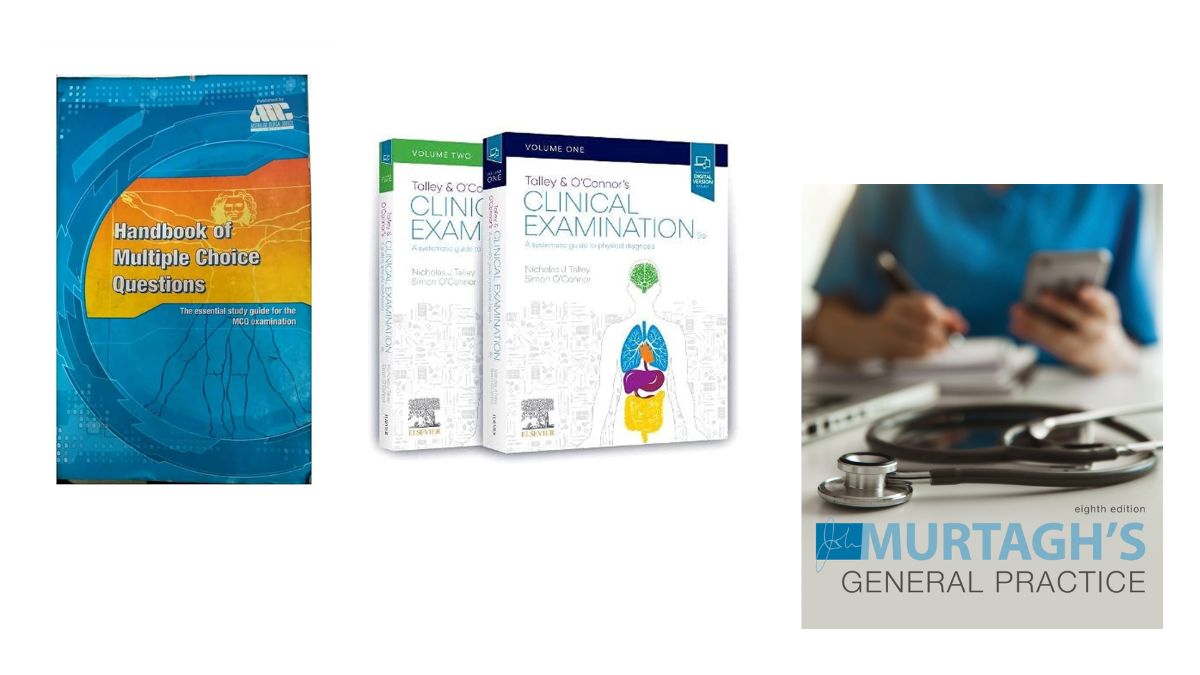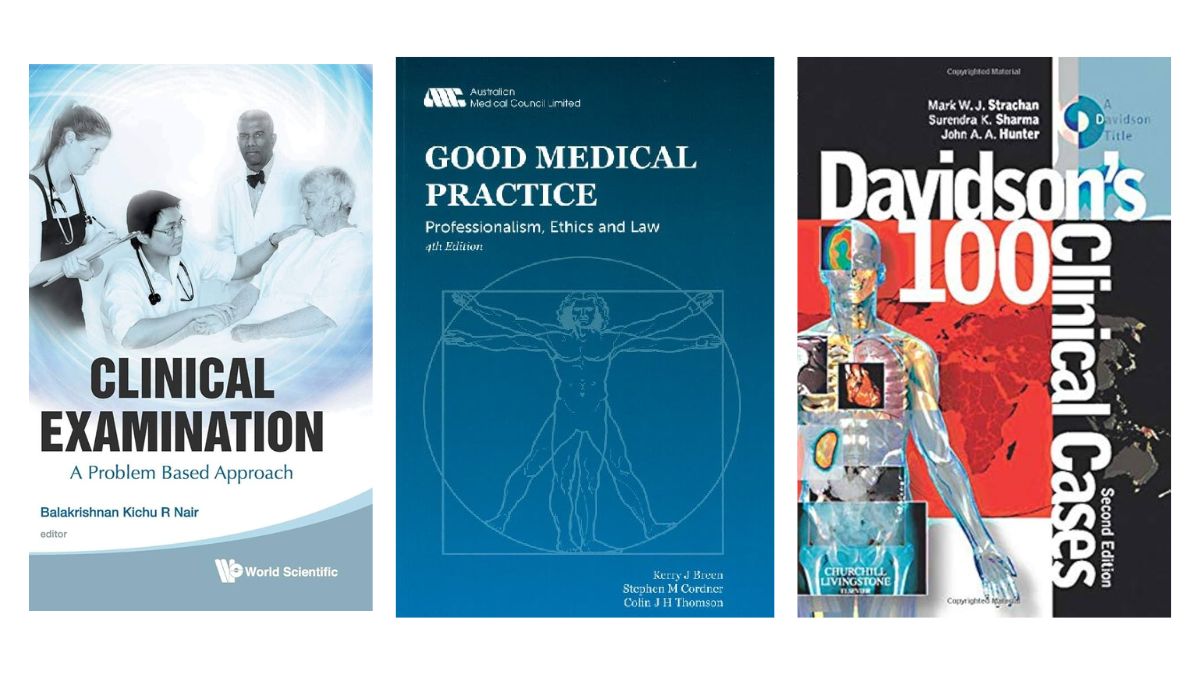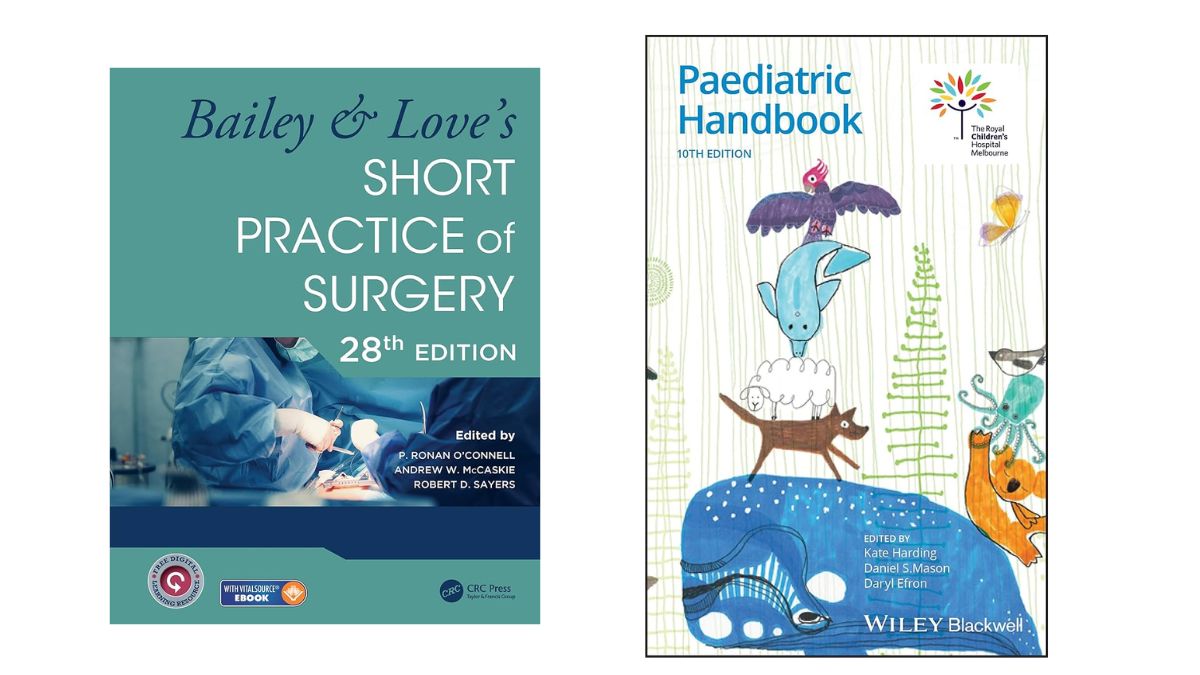Did you know… thousands of registered doctors appeared for the AMC exam last year? Yes, you heard it right. But why do so many candidates apply for AMC every year? The Australian Medical Council (AMC) examination is designed to assess your medical knowledge and your ability to apply it effectively in the Australian healthcare system. But here’s the truth nobody tells you:
“Success in the AMC exam doesn’t come from reading everything. It comes from knowing what to read and how to use it.”
That’s exactly what this blog gives you: an expert-recommended list of AMC exam preparation books, how to use them, and a plan to ensure your time is spent on what examiners actually test.
AMC MCQ Exam: The Books You Need
The first hurdle for every IMG is the AMC MCQ exam, a 150-question computer-adaptive test (CAT) that lasts 3.5 hours. It tests:
- Basic sciences
- Applied clinical knowledge
- Clinical reasoning
- Public health & ethics
The Core MCQ Books
Here’s what to include in your arsenal, drawn from official AMC documents and top coaching advice:
| Book | Why It Matters | Where It Helps |
| AMC Handbook of MCQs | Directly from AMC; practice format identical to real exam | Self-testing, MCQ logic |
| Anthology of Medical Conditions | AMC’s official resource mapping symptoms to conditions | Clinical reasoning, differentials |
| Talley & O’Connor – Clinical Examination | Core skills that often sneak into MCQs | Physical signs, OSCE overlap |
| Davidson’s Principles & Practice of Medicine | Trusted textbook for adult medicine | System-wise knowledge |
| Murtagh’s General Practice | Australian-focused medicine | Community health scenarios |
| Therapeutic Guidelines | Must-know prescribing rules | Drug management MCQs |
| Australian Medicines Handbook | Drug doses, interactions | Prescribing safely |
Cost note:
- Therapeutic Guidelines subscription ~AUD 399/year (₹22,000–₹28,000)
- AMH ~AUD 295/year (₹16,000–₹21,000)

How To Use These Books Effectively
- Talley & O’Connor: Don’t read it like a novel. Pick systems, e.g. respiratory, and match it with MCQs.
- Anthology: Great for random 15-minute reading bursts. Pick any clinical presentation and challenge yourself to recall differentials.
Murtagh’s: Covers local practice scenarios crucial for AMC. Don’t skip the chapters on remote medicine, Indigenous health, and communication tips.
AMC Clinical Exam – Books You Can’t Skip
Once you’ve cleared the MCQ, the AMC Clinical Examination awaits. A practical, OSCE-style test across 16 stations. Each station targets one of four Predominant Assessment Areas (PAAs):
- History Taking
- Examination Skills
- Diagnostic Formulation
- Management, Education, Counselling
Essential Books for Clinical Preparation
| Book | Why You Need It |
| Talley & O’Connor – Clinical Examination | Bible for physical examination skills |
| Nair’s Clinical Examination: A Problem-Based Approach | Teaches logical clinical reasoning |
| Good Medical Practice (AMC Edition) | Core for professionalism, ethics, laws in Australia |
| Reynolds’ Understanding the Australian Healthcare System | Helps tackle systemic and communication stations |
| Remote Primary Health Care Manuals | Critical for Indigenous & rural stations |
| Davidson’s Clinical Cases | Practice cases similar to AMC stations |

How to Use These Books to Pass OSCE
- Practice speaking aloud your findings. The AMC examiner tips stress how important clear verbal communication is.
- Use the Remote Primary Health Care Manuals for scenarios involving remote medicine, cultural safety, or Indigenous patients. These appear in ~10% of stations.
Learn to structure history-taking as per time limits given in each station.
Specialty-Wise AMC Exam Books
Medicine
- Davidson’s Principles & Practice of Medicine
- Murtagh’s General Practice
- AMC Anthology of Medical Conditions
- BMJ Learning for clinical cases
Surgery
- Bailey & Love’s Short Practice of Surgery
- Surgical Recall – quick revision, excellent for MCQ
Paediatrics
- Paediatric Handbook – Royal Children’s Hospital
- Practical Paediatrics – Roberton & South
- ChAMP Guidelines – medication doses for children
Women’s Health
- Obstetrics by Ten Teachers
- RCOG Guidelines
Psychiatry
- Positive Psychiatry & Mental Health – University of Sydney (Free)
- Foundations of International Psychiatry – University of Melbourne (Free)
- WPA Education Portal

Indigenous & Cultural Safety Books – Don’t Miss These
AMC increasingly tests cultural safety, particularly in Indigenous health. Key AMC exam references include:
- Aboriginal Primary Health Care (Couzos & Murray)
- Billabongs of Knowledge (Tujague & Ryan)
- Traditional Healers of Central Australia – a must for OSCE background
Tips From AMC Examiners – What Books Alone Can’t Teach
From the AMC Tips from Examiners document:
- Always read the station instructions carefully. Don’t assume.
- Be systematic in history-taking and examination.
- Don’t use jargon with patients—speak plainly.
- Don’t say, “I would examine…”—actually do it.
- Report positive and significant negative findings.
- Never guess a diagnosis without data—examiners mark you down for jumping to conclusions.
This is why you must combine books with practice simulations.
Join Dr. Ashique Rasheed, a proud Academically student, as he shares his inspiring journey of preparing for and understanding the AMC Exam (Australia) in this exclusive interview with Dr. Rini Sharma.
How To Build a Study Plan Using These Books
Here’s how a real-life AMC study week looks for many successful candidates:
| Morning | Afternoon | Evening |
| Davidson’s – read one system | AMC Handbook MCQs | Review Anthology cases |
| Talley – practice OSCEs | Geeky Medics practice | Record yourself explaining findings |
| AMH/Therapeutic Guidelines | Ethics reading | OSCE role-play |
| Murtagh’s GP | Cultural safety readings | Flashcards |
| Clinical trial exams | Reflection & gaps | Plan next week |
| Rest or light review | Peer group discussions | Relaxation |
| Catch-up | Family time | Sleep |
Are AMC Books Alone Enough?
The short answer is no.
Here’s the reality:
- Books lay the foundation.
- Practice cements your skills.
- Mock exams build confidence.
No candidate passes purely from reading, even if they memorise every page. The AMC exams demand:
- Speaking skills
- Cultural safety awareness
- Diagnostic reasoning under time pressure
So yes, you need books. But you also need practice. Pursue a comprehensive AMC Exam Preparation Course from critically acclaimed coaching centres like Academically. Get hugely benefited from expert-led sessions, AI-based mock tests, community groups on Discord, WhatsApp, and 1-on-1 doubt-clearing sessions.
To conclude with…
By now, you should have a clear idea of:
- Which AMC exam preparation books are essential
- How to use them for both MCQ and Clinical exams
- The hidden topics, like cultural safety, that books help you cover
- Why examiners emphasise practice over rote learning
Above all:
“The best AMC candidates study smart, not just hard.”
Your journey can feel overwhelming, but you’re never alone. Equip yourself with the right books, practice intentionally, and reach out for help when needed.